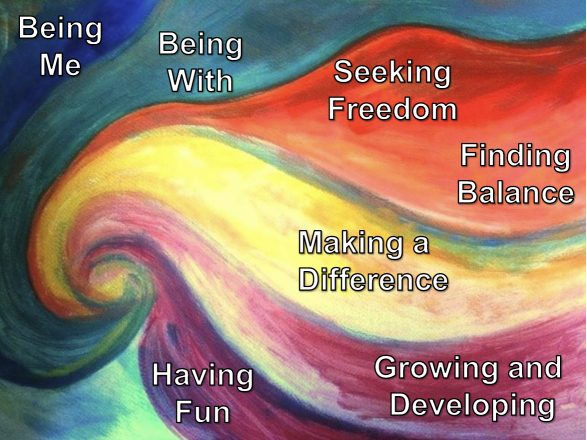In this edition
- Finding Meaningful Opportunities While Living with Dementia: A Researcher’s Story…
- Water, Water, Water and MORE Water…
- Chicken Fajita Recipe
About the Newsletter
In honor of World Alzheimer’s day, we asked Jennifer Carson, Ph.D., to share her thoughts on dementia and meaningful activities. In addition, learn the importance of drinking water and we are sharing a delicious fajita recipe that you can try this month!
Finding Meaningful Opportunities While Living with Dementia: A Researcher’s Story…
By Jennifer Carson, Ph.D.

Figure 1. Celebrating and Living Life through Leisure (Dupuis, Whyte, Carson, et al., 2012) Oil Painting with various colors of blue, green, orange, yellow and red that depicts opportunities to have meaningful experiences.
Each September, people from all corners of the world raise awareness around Alzheimer’s disease and other types of dementia. As part of World Alzheimer’s Month, it’s important to also consider the rights of people living with dementia, including the right to leisure. Leisure is more than fun and games. According to Dr. Charles Sylvester, leisure is “the celebration of freedom at its crowing point.” Like all citizens, people living with dementia have a right to leisure wherever they may live. In 2012, I worked on a research project* that aimed to better understand the meaning of leisure for people living with dementia. Our team conducted more than 200 surveys and interviews with people living with dementia in a variety of settings. We asked questions about what brings leisure, meaning and well-being into their lives. We learned that when people have regular opportunities to engage in meaningful experiences, they can live well with dementia.
These meaningful experiences include opportunities for:
- Being Me: Opportunities to engage in activities that are personally meaningful and connected with current or past interests
- Being With: Opportunities to be with other people, pets or nature that support feelings of belonging and community
- Seeking Freedom: Opportunities that provide a break from the stress of daily tasks and responsibilities
- Finding Balance: Opportunities to find or create a sense of balance between relaxation and keeping busy – too much or too little of either is not good
- Making a Difference: Opportunities for a sense of purpose
- Growing and Developing: Opportunities to challenge the mind and the body, learn new things or have new experiences
- Having Fun: Opportunities to feel pleasure, enjoyment, happiness and to share a sense of humor
Since partnering on this research, I have continued my work and commitment to supporting the well-being of people living with dementia. Both as a professional care partner, and beginning in 2016, as a family care partner when one of my parents was diagnosed with dementia. As I’ve continued in these roles, I have come to appreciate, more than ever, the important role meaningful engagement plays. Not just in supporting well-being, but also in reducing or ending distress. I’ve learned that most expressions of distress among people living with dementia represent an unmet need of some kind. This could feel like a threat to their well-being. Instead of treating the distress by negatively reacting, everyone’s primary goal should always be supporting well-being. As a care partner, I have found this outline for thinking about and supporting well-being very helpful. I also use this to reflect upon and foster my own well-being. When my well-being is supported, I show up more. I am present, centered and capable of supporting the well-being of myself and other people in my life, including those living with dementia.
*Note: This research was published in the following article: Dupuis, S.L., Whyte, C., Carson, J., Genoe, R., Meschino. L.M., & Sadler, L. (2012). Just dance with me: An authentic partnership approach in understanding leisure in the dementia context. World Leisure Journal on Leisure, Health, and Disability. 54(3), 240-254).
Learn more about the author
Water, Water, Water and MORE Water…
By Anne Lindsay

A woman drinking a glass of water.
Every cell, tissue, organ and most every life-sustaining body process needs water to function. Generally speaking, adults over 65 need about 1.7 liters of water each day (about 58 ounces). It is best to sip small amounts of fluid throughout the day, especially during hot weather and while exercising. Hydrate the body both before and during exercise or physical activities, especially outdoors. Drink slowly for about 2 hours before your activity to allow time for fluid absorption, and then drink periodically during the activity. During periods of high-water loss (e.g. hot weather, sweating or exercise), our water needs increase. It may be helpful to eat a few salty snacks to help retain cellular fluids or stimulate thirst. The key to fluid balance is being proactive. An important part of our regular diet, we drink water by the glass, we get it from foods we eat and we even use it to prepare instant foods (e.g., oatmeal). So, drink up, enjoy water throughout the day and stay hydrated and healthy.
Chicken Fajitas
Adapted from Spend Smart Eat Smart

Three chicken fajita tacos on a plate.
You don’t have to go to a restaurant to have delicious fajitas for dinner! The cumin in this recipe helps in promoting better mental health and sharpen the memory by nourishing the brain cells. Skip the tortilla and enjoy these fajitas in a bowl with your favorite toppings!
Ingredients:
- 1 pound boneless, skinless chicken breast
- 2 teaspoons chili powder
- 2 teaspoons garlic powder
- 2 teaspoons cumin powder
- 1 red bell peppers, thinly sliced
- 1 green bell peppers, thinly sliced
- 1 white onion, thinly sliced
- 2 tablespoons olive oil
- 6 whole wheat tortillas
Directions:
- Freeze chicken 30 minutes until firm and easier to cut. Cut chicken into 1/4" strips. Place in a single layer on a plate. Wash hands, knife, and cutting board. Sprinkle both sides of strips with chili, cumin and garlic powder.
- Add oil to a 12 inch skillet. Heat to medium high. Add chicken strips. Cook about 3-5 minutes, stirring frequently.
- Add bell peppers and onion. Stir and cook until vegetables are tender and chicken is no longer pink. (Heat chicken to at least 165°F).
- Scoop chicken mixture ( 2/3 cup each) onto tortillas. Top with your favorite toppings.
Spend Smart Eat Smart Recipe


